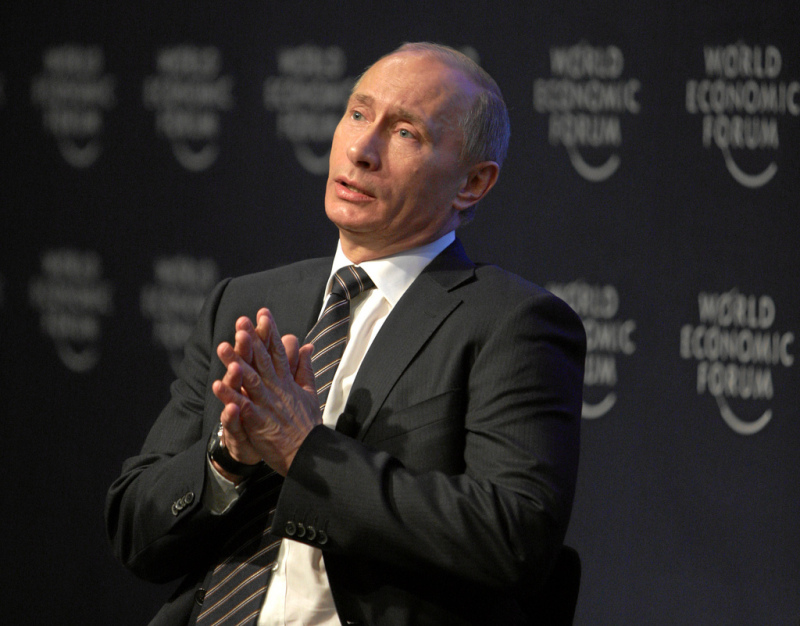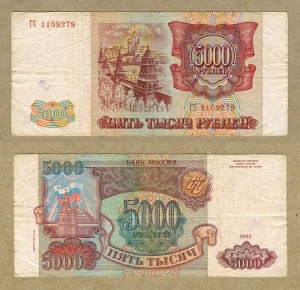By Alex Plough December 19, 2014

Vladimir Putin, at the World Economic Forum in Davos, Switzerland, 2009. © World Economic Forum.
Russia’s Currency Rout
Russian president Vladimir Putin was already facing the toughest economic challenges of his presidency when the value of the country’s currency went into free-fall this week.
On Monday evening, foreign exchange traders and investors began selling the Russian ruble like crazy and its value plunged as much 20% against the U.S. dollar. The next day it hit a historic low of 64 rubles against the dollar and recorded its largest intraday drop since 1999.
As onlookers warned of a potential countrywide economic collapse, the Central Bank of Russia announced a monster interest rate hike from 10.5% to 17%, broadcasting the decision at 1am Moscow time.
The gambit helped stop the rout, but Wednesday morning, Finance Ministry officials announced further measures: They will spend $7 billion in foreign currency reserves to buy rubles on the open market and boost its value.

Russian 5000 Ruble Note, 1993. © Bob Marquart
Only a few months ago Putin reassured the country’s business elite that a $400 billion war chest of foreign currency would weather any selling pressure on the ruble. But a combination of economic sanctions targeting Russia’s biggest companies, as a result of its involvement in Ukraine’s civil war, along with record low oil prices is strangling the resource-dependent economy and eroding Putin’s domestic authority.
The country’s nervous oligarchs have anticipated the dire situation in Russia by shoring up their overseas assets in recent years. Bloomberg looks at commodities billionaire Mikhail Prokhorov’s most secure investment, the NBA’s Brooklyn Nets. Meanwhile the $88 million price tag Russian billionaire Dmitry Rybolovlev paid for a Central Park West penthouse in 2012 now looks like a great deal according to Businessweek.
Cuban Cigars, Anyone?
Fidel and Raul Castro. © Robin
On Wednesday, President Barack Obama announced that the United States would resume diplomatic relations with Cuba after more than 50 years of mutual antagonism.
A day earlier, Obama and his Cuban counterpart Raul Castro had reportedly spent 45 minutes talking over the phone. It was a historic conversation, brokered in part by Pope Francis, and represented the culmination of a year of secret negotiations between the two heads of state.
The U.S. will eventually open full-fledged diplomatic mission in Havana, the first time Cuba has hosted a US ambassador since relations were severed in 1961. It also is taking a first step towards ending the US embargo, which has crippled Cuba since the collapse of its biggest trading partner, the Soviet Union.
Cuban cigars (Bolivar Belicoso Fino, Cohiba Siglo IV, Cuaba Distinguidos, Trinidad Robusto Extra, Hoyo Churchill). © Alex Brown
Wednesday’s deal included a provision allowing travelers to the U.S. to bring into the country $400 in Cuban goods, including tobacco and alcohol products worth less than $100 combined—you can expect many more Americans will finally experience the forbidden taste of Cuba’s legendary cigars.
Despite a half-century-old policy of economic isolation, the US has been paying Cuba roughly $4,085 annually in rent for the 45-square-mile naval base at Guantanamo Bay according to Vice News. For decades President Raul Castro and his brother Fidel, the former leader, symbolically refused to cash these checks as they didn’t recognize the legitimacy of Guantanamo’s lease, which was signed before the 1953 socialist revolution. Vice News has chronicled the fascinating legal history of America’s most controversial detention facility.
Cuba’s New Investors
This week’s good news about a thawing of US-Cuba relations may have boosted the share price of a tiny energy-drink company, which just happens to be called Cuba Beverage Co. but has no connection to the island off Miami. Its stock, which trades over the counter under the ticker CUBV, was recently up nearly 140% to 3.8 cents a share after the news. It is unclear what this tells us about the efficiency of markets.
Citigroup’s Fingerprints on Spending Package
Late last Saturday evening, US senators just managed to pass a $1.1 trillion spending package that will fund the government through the end of the fiscal year.
Senate conservatives wielded their new power following recent midterm elections with last-minute brinkmanship, including Texas senator Ted Cruz’s ultimately futile effort to defund President Obama’s immigration action last Nov. 20 action allowing up to 5 million undocumented immigrants to stay in the U.S.
Elizabeth Warren, © Edward Kimmel
Senator Elizabeth Warren complained on Twitter that the US banking giant Citigroup was holding up negotiations through its lobbying efforts to undo parts of the Dodd-Frank financial reforms passed just four years ago.
Last year the New York Times exposed Citigroup lobbyists as the authors of a bill to exempt broad swathes of derivatives trading from regulation. The Senate never voted on the bill but lawmakers snuck the Citi-sponsored legislation into Saturday’s spending package, outraging Democrats and politically liberal media outlets alike.
From Texan Toilets to the Syrian Front Line
They say there is no such thing as bad publicity, but a Texas plumber recently tested this aphorism after his company logo appeared on prime time television—on the side of a truck operated by Islamic militants in Syria.
On Monday, a faction in the Syrian civil war released publicity photos of a heavy anti-aircraft gun mounted on the back of a Ford F-250 decorated with the name and number of Mark-1, a plumbing operation in Texas City, Texas.
According to local news reports, Mark-1’s mangers have been forced to defend themselves against angry phone calls from Americans who think the ‘mom and pop’ firm supports Syrian extremists.
This entry was posted on Friday, December 19th, 2014 at 5:02 pm. It is filed under Week in Review and tagged with Brooklyn Nets, Citigroup, Cuba Beverage Co., Fidel Castro, Pope Francis, President Barack Obama, Raul Castro, Vladimir Putin. You can follow any responses to this entry through the RSS 2.0 feed.
Comments are closed.
